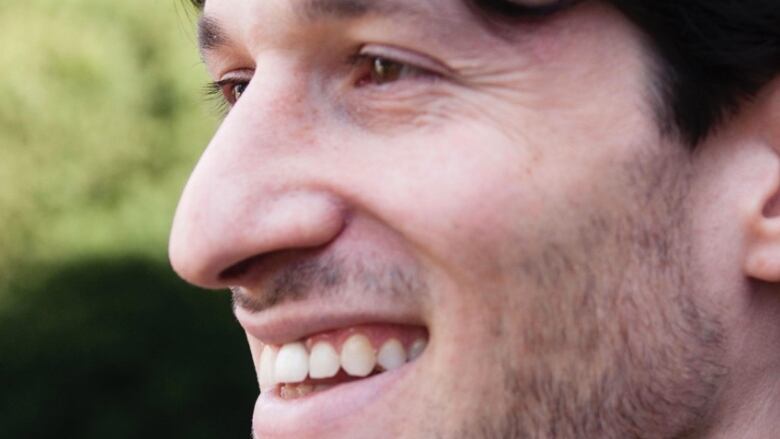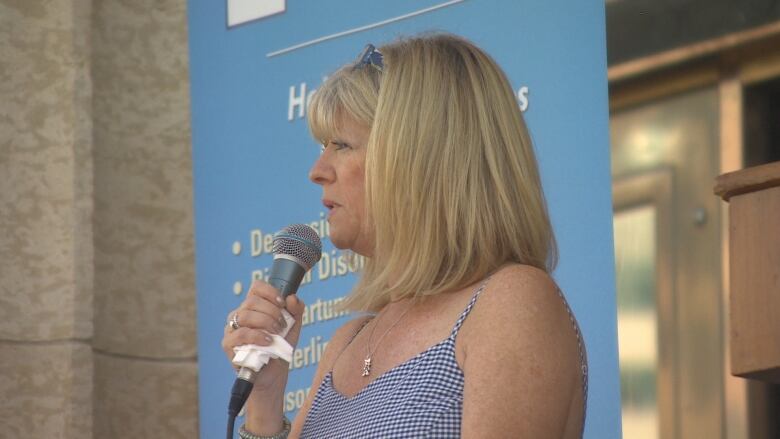Mom who lost son to suicide praises mental health report's advice around privacy law
Report recommends provincial program to facilitate sharing information with family members

After years of advocating for changes to Manitoba's health information privacy laws, a Winnipeg mom who lost her son to suicide said she's encouraged and optimistic about updatesrecommended in a newly released report.
"We're going to see a very much improved mental health and addictions system in Manitoba" if government embraces the recommendations,Bonnie Bricker said Monday.
Changes surroundingManitoba's Personal Health Information Act were recommended in the report, Improving Access and Co-ordination of Mental Health and Addiction Services: A Provincial Strategy for all Manitobans, which wascommissioned by the provincelast year and released Monday by Virgo Planning and Evaluation.
Bricker's son Reid died by suicide when he was 33 in October 2015, shortly after being released from the hospital he went to for help.
His family wasn't notified of his release because of privacy laws that prevent hospital staff from releasing information without patient consent.
Since 2015, Bricker now a family navigator with the Mood Disorders Association of Manitoba has made calls for a mental health overhaul in the province, including increased peer support for people in need and changes to the province's Personal Health Information Act,whichguides the release of information to family.
The law was the focus of one of 130 recommendations in thehighly anticipated report on Manitoba's mental health and addictions services.
Recommendation 2.4encourages government to "design and implement a provincial program for facilitating consent to share information with family members and other loved ones, including education and training of SUA/MH [substance use/addiction and mental health] workers to allay fears about PHIA."
"This work should be informed by lessons learned in Nova Scotia, where a similar provincial initiative has been undertaken, from which guidance and resources may be available," the report says.

Bricker said she made that recommendation to report author Dr. Brian Rush and his team during their consultations with Manitobans.
The report was subject to criticism Monday after a recommendation to create a safe injection site in Winnipeg appeared inan early draft sent to media in error, but not in the final version uploaded to the government's website hours later.
Rush told media Monday he removed the recommendationbecause he didn't have enough data to support it.
'Circle of care'
Family members often serve as a "circle of care" for people in mental health crises after they leave the hospital, Bricker said, and leaving them in the dark about health changes makes their job harder.
"What is that [change] going to look like? That's going to mean re-education and adaptation of attitude and presentation in terms of the privacy health and information act," she said.
"They don't want to be disclosing personal health where it would be a detriment to that person."
Everyone that walks into our centresays 'We want one in our neighbourhood'- Nancy Heinrichs
The NorWest Youth Hub, a drop-in centre for people age14-24 in Tyndall Park, was praised in the report as a model for engaging young people to help them cope with mental health issues.
The hub is not provincially funded, saidNancy Heinrichs,executive director of NorWest Co-op Community Health, which runs the program. Morethan 1,700 youth have visited the centre since it opened in January 2017, she said.
"Everyone that walks into our centresays 'We want one in our neighbourhood,'" Heinrichs said.
Heinrichshopes the report's praise will mean they no longer have to search for piecemeal funding from various charities and organizations to continue to operate.
The hub is the only one in the province but Heinrichshopes to see the model followed elsewhere.
'A step in the right direction'
Danielle Lalonde, who foundedWestman Families of Addicts, said the report contained some ideas she's stoodbehind for months, like increased collaboration between existing agencies and the need for more funding.
"I'm not sure vindicated was the right word," she said, laughing."I had been shouting this from the rooftop for quite a while."
"I'm glad that they're finally recognizing that and that there's somebody other than just the warrior mamas that are now saying, these are the things that we need. I feel better that the government is maybe taking a step in the right direction."
Lalonde, who lives in Brandon,started the group when her son became addicted to meth ayear ago. Since then, she said she's seen people looking for help be directed from one provider to another.
"We're expecting people with mental health disorders and substance abuse disorders to actually be able to navigate that system, when quite honestly they're having problems navigating life, which is what has led them into the addiction to begin with," she said.
"A very positive first step would be to bring everybody to the table," she said. "Putting egos to the side is probably the main thing and realizing that this isn't a partisan issue."
Bricker said Manitobans who support the ideas in the report now have to make sure their government representatives know.
"No one, no one can sit back and rest on their laurels and say, 'Somebody else is going to look after this,'" she said. "Becauseguess what?Mental health and addictions concern every single Manitoban."
If you or anyone you know is experiencing suicidal thoughts, reach out for help from one of several Manitoba crisis lines listed on the Manitoba governmentwebsite.You can also contact the Manitoba Suicide Line toll-free at 1-877-435-7170 (1-877-HELP170) or the Kids Help Phone at 1-800-688-6868.
With files from Donna Carreiro and Elisha Dacey












_(720p).jpg)


 OFFICIAL HD MUSIC VIDEO.jpg)
.jpg)



























































































